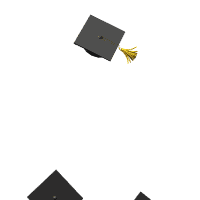College - Is it for me?
What colleges can I attend?
The first thing to consider is your high school diploma options. If you earn a standard diploma or a GED diploma you have the option to apply to any publicly funded university or college or community college. There are, however, other requirements. Four year colleges or universities require appropriate scores on the Scholastic Aptitude Test (SAT) and on the American College Test (ACT). If you received accommodations in high school for test taking you should also receive them for these tests. Your score can not be considered if the accommodations were specified and not made available.
All public universities and colleges are required to accept students with disabilities if the student has met the requirements for admission. The university is not allowed to ask if you are disabled but by law (Section 504) must provide accommodations if you choose to let them know about your disability and have appropriate documentation of the disability. Your high school counselor or college counselor would be able to provide you with more information on this.
A good resource to answer more questions would be The Association on Higher Education and Disabilities (AHEAD) at PO Box 21192, Columbus, Oh 43221-0192 - (614)488-4972 - (614)588-1174 (fax) - http://www.ahead.org.
It's the law:
Section 504 of the Rehabilitation Act of 1973 states:
"No otherwise qualified person with a disability in the United States...shall, solely by reason of...disability, be denied the benefits of, be excluded from participation in, or be subjected to discrimination under any program or activity receiving federal financial assistance."
Under the provisions of Section 504, universities and colleges the receive public funding may not:
- limit the number of students with disabilities admitted;
- make preadmission inquiries as to whether or not an applicant is disabled;
- use admissions tests or criteria that inadequately measure the academic qualifications of disabled students because special provisions were not made for them;
- exclude a qualified student with a disability from any course of study;
- limit eligibility to a student with a disability for financial assistance or otherwise discriminate in administering scholarships, fellowships, internships, or assistantships on the basis of disability;
- counsel a student with a disability toward a more restrictive career;
- measure student achievement using modes that adversely discriminate against a student with a disability; or
- establish rules and policies that may adversely affect students with disabilities.
Click here for information on financial assistance.
